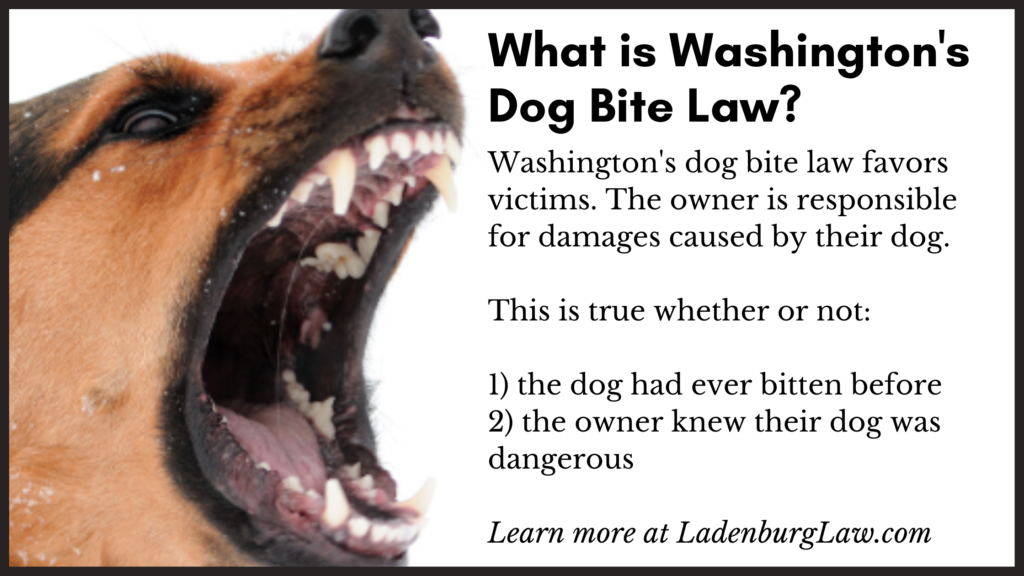Free Case Evaluation
(253) 272-5226Free Case Evaluation
(253) 272-5226Dog bites are not only painful, but they can also be stressful to deal with and expensive to treat. If this event happened to you in Washington State, you might want to know what the dog bite laws are.
Over the years, our dog bite attorneys have heard these questions many times. Here’s what you need to know.
Washington State’s law makes it clear that when a dog bites someone, the owner is responsible to pay for the victim’s damages (RCW 16.08.040). This is true whether or not the dog had bitten before, or if the owner had prior knowledge of the dog’s potential to bite.
Here are a few additional points about the dog bite law in Washington you should be aware of:
To sum up, Washington State law favors victims of dog bites. The law also holds owners accountable for their dog’s actions at all times. Remember, laws can and do change over time. While we’ve worked to keep our post current, you may wish to read Chapter 16.08 which deals with dog ownership in Washington.
Depending on where the bite took place, city and county laws may be a factor, too. An experienced Washington dog bite lawyer can help determine if any local laws apply to your situation.

There is no state-wide law that requires owners to keep their pets on a leash. However, many cities and communities within the state may have their own leash laws. Plus, certain properties, such as those belonging to schools or parks, may have posted rules about dogs. When in a state park, owners must keep their dogs on a leash no longer than 8 feet.
In general, it’s a good idea for dog owners to keep their pets leashed unless on their private property or a designated “off leash” park.
We recognize that a dog bite is a chaotic event, with lots of elements and people involved. Here are the things we recommend you do immediately following a dog bite:
The Mayo Clinic also has some additional information on caring for minor wounds at home, or until you can get to a health-care provider.
We recommend that you report the dog bite to your local animal control office. Reporting the incident helps protect other people from being hurt. It also helps your case, should you choose to file a lawsuit.
Here’s where to file a dog bite complaint in Washington State:
Live elsewhere? Search for your county’s animal control department to file a complaint.
The animal control department for your city or county may have their own guidelines for handling dangerous dogs.
There are a variety of consequences for a dog bite. Most likely, the owner will face a hefty fee. Depending on past incidents with the dog and the nature of the attack, the dog may be quarantined in the owner’s home, or required to wear a muzzle. In severe cases, the dog may need to be euthanized (for instance, if the attack was fatal).
What you should know: filing a lawsuit has no bearing if the dog will be removed from its home or euthanized. Animal control will make that decision – it has nothing to do with your case. Our attorneys are only focused on helping you get compensation for your injuries.
In Washington State, the dog owner is responsible for paying for your injuries. In general, their homeowner’s or renter’s insurance will cover your claim. If the claim exceeds the coverage, they will be responsible for the difference.
Consider these statistics from the Insurance Information Institute:
Dealing with a dog bite injury can be complicated and stressful. Often, it’s best to call a qualified dog bite attorney. At Ladenburg Law, we’ll take on the stress of handling the details so you can focus on your healing. Insurance companies may pay settlements that won’t fully compensate your losses. Call us today for a no-fee consultation about your case.